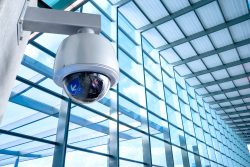5 Considerations for a College and University Commercial Video Surveillance System
Protecting a large campus with numerous buildings and miles of streets and walking trails is a constant challenge. Even when the college or university is closed for a break, the security team needs to keep a constant eye on the property to prevent theft and vandalism. There are many specific factors that affect the final design of a commercial video surveillance system for a college, making it the kind of job best left to a security system company.

Complying with the Clery Act
Facilities that accept federal student aid must comply with the Clery Act, which mandates how these organizations track and report crimes that occur on their properties. The Clery Act Appendix for FSA Handbook in particular outlines the requirements for tracking crimes, preparing incident reports, distributing information to the public, and disclosing fire safety information to students and staff alike. You need to be sure your commercial security systems make compliance easier rather than harder by giving you clear records for incident reporting and crime tracking purposes. Commercial fire alarm systems also need to offer clear alarms and easy operation so you don't have to hold extensive training drills to use them.
Combining Types of Cameras
Due to the size and scope of most campus properties, you'll need a combination of different security cameras to cover the entire property. Outdoor vandal-resistant cameras give your security team a clear view of anything that's happening in parking lots, between buildings, and along roads. Indoor camera systems extend the view to all of the buildings and covered spaces that make up the campus. Knowing where to place what kind of camera and how to secure it from tampering is the key to building a complete commercial video surveillance system.
Securing Data Involving Students and the Public
Don't forget the need to secure all recordings and other related security data of the college's students, staff, and passing members of the public. Not only do you need to prevent unauthorized access to this material, but you'll need to keep it and label it so the right footage can be found if there's an investigation. Data storage is as much a part of a commercial video surveillance system as the cameras and monitors.
Issuing Remote Lockdown Alerts
Comprehensive security systems aren't just passive designs that record information. They also work to transmit important information when necessary throughout the campus. If the security team feels the need to issue a lockdown alert, alarms should work in conjunction with text and email notifications to reach the largest audience possible. Auto-locking doors also help secure the campus, especially with remote access from the security center.
Prioritizing System Security
The security system itself needs to remain secure and resistant to tampering or unauthorized access. Wireless systems need the highest levels of encryption, while wiring for power should be installed in protected areas so it's not easily compromised. These are all considerations that a professional security system company will prioritize when planning out the installation for your college or university campus.
Sources
universitybusiness.com/as-student-fears-ris..